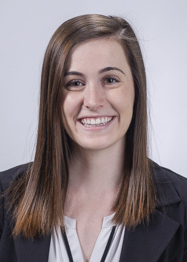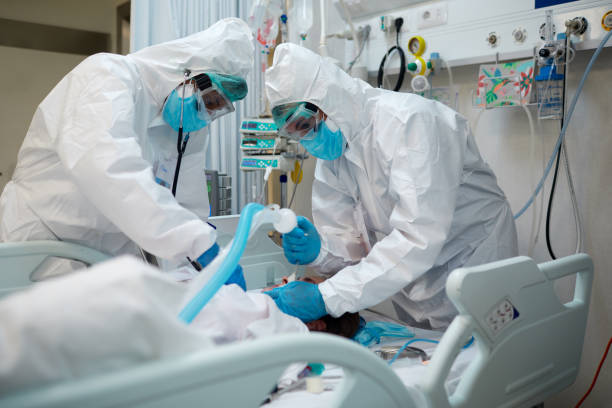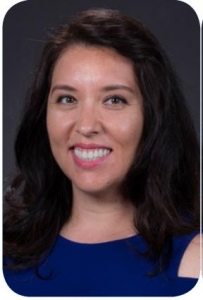
Jenna Koblinski graduated from The University of Arizona College of Medicine – Phoenix in May 2021, and is a former Editor-in-Chief for The Differential. She is currently an Internal Medicine preliminary resident at Banner University Medical Center – Phoenix and has been working in the Intensive Care Unit (ICU) of the hospital for the last several weeks. She took the time out of her demanding schedule to answer some questions about her experience as Arizona continues to be battered by a 3rd wave of COVID-19 infections amid low vaccination rates.
1. How does the day-to-day life of an intern compare to your expectations?
The day-to-day life of an intern actually fits in pretty well with my expectations. I am lucky to be at a program where I have support from my co-residents and faculty, which really makes a difference. I was definitely nervous about increasing my patient load compared to when I was a medical student, but you pick it up quicker than you think. I will say working six days a week for multiple weeks definitely takes its toll on you, but it is rewarding to finally be able to be someone’s doctor and have my decisions really affect their care.
2. What is it like working in the ICU during the “delta wave?”
My experience in the ICU does not even compare to those who are consistently in the ICU such as the intensivists, ICU nurses, and respiratory therapists, and I can’t imagine having been in the ICU during the first wave as well as the delta wave, but my limited experience in the ICU during the delta wave taught me a lot and truly has permanently impacted me.
I remember my first COVID patient… I didn’t really see his face until after a week of being on service because he was prone (laying on his stomach) and was too unstable to be placed in a supine position (on his back). We often prone patients to assist and improve their breathing, but usually the nurses will be alternating their positioning to avoid pressure ulcers. However, this patient was desatting (their oxygen was too low) with them supine, so I could only see half of his face. It really was striking to me because I am someone who tries to make personal connections with my patients and make eye contact, but in this case I could not. Even in my other intubated patients, you can still see their faces and who they are even if they are sedated. It felt really foreign to not know what he looked like and I remember when he was finally able to be turned a week later the first thing I said when I came into the room was, “Oh my goodness! It is lovely to see your face!” (I try to talk to all of the patients regardless of their sedation).
Part of being in the ICU involves listening to the patients’ lungs every day. Auscultation is a skill and it takes practice and I will be the first to admit my ears are not yet fine-tuned. I have difficulty hearing some findings (maybe I listened to too much music with my headphones at full volume growing up); however, there was no missing the lung findings on my first COVID patient. I had seen COVID X-rays and the extensive white-out and damage caused to the body, but I was not expecting human lungs to sound this way. It sounded like Velcro being ripped apart or a car driving over gravel and it was LOUD. I had just listened to the lungs of another patient who was requiring ICU care for non-COVID pneumonia and his lungs didn’t sound good, but they paled in comparison to these lungs. Seeing and hearing the havoc wreaked on patients was really scary and my worry for my loved ones and my community really increased and that day on social media I again advocated for everyone I knew to get the vaccine.
Finally, I think one of the biggest things affecting what it is like working in the delta wave is how slow patients heal from COVID (if they do ultimately heal). On top of ventilated patients, we had multiple patients on ECMO (machine bypassing your heart and lungs) and on CRRT (machine replacing your kidneys) because of the damage COVID had done and the efforts made to get patients off of these machines were slow and scary in the COVID patients. There are patients who were in the ICU before I went on service and I periodically check (I care about them and want to see their progress) and they are still in the ICU months later. My hospital had to open a new ICU team again because of how full the hospital is with COVID patients. The worst part is many of these patients who are hospitalized for months don’t end up surviving and the last few months of their lives involve being in a hospital away from loved ones. There are so many people fighting for them and working to care for them in the best way possible, but COVID is so harmful, sometimes there is nothing more that can be done.
3. Have you had patients or patients’ families express regret about not getting vaccinated, or anything else in particular? Have you had families of patients change their minds and become vaccinated?
The families of the patients are really impactful to me because they are able to share who the patient is outside of their hospitalization and will oftentimes bring in photos for the bedside. The photos of the patients living their lives compared to the person in the bed is often striking.
All of the COVID patients I cared for in the ICU were unvaccinated, which is really difficult when these devastating complications occur and could have been avoided or lessened. I think it is important to note that we give every patient the best care we have to offer and their being unvaccinated doesn’t affect that, but vaccinations are so important that we talk to every family member and alert patients about them. I personally have not talked to any patients about their being unvaccinated because by the time I met them, they were already intubated. There are patients whose families say they had regrets of not getting vaccinated prior to their intubation which is heartbreaking. There are a lot of stories of families and significant others getting vaccinated as soon as their loved one is hospitalized and they really see how scary COVID is. Many times they become some of the biggest vaccine advocates and while the circumstances that led to their vaccinations are unfortunate, it is a silver lining that they are able to protect themselves and want to help others.
However, there are families with a loved one actively dying from COVID who can see firsthand the wreckage COVID is causing on their family member, who still say they refuse the vaccine for many reasons (it is “a hoax,” it is “too new”, it “won’t help”). It is both frustrating and heartbreaking and while we try to further elicit where their concerns are stemming from and provide education, oftentimes their minds are already made up. All we can do is try to do the best for their loved one and hope the family members stay safe. I will never forget looking into the innocent, young, pleading eyes of a patient’s teenage son and telling him his father is dying and him still saying, we don’t know enough about what the vaccine effects are. I truly understand the initial concerns about the vaccine because it is new, but when you do the research the evidence overwhelmingly supports the vaccine’s safety and efficacy; it is clear that mRNA vaccines have been researched pre-COVID. Further, even if we don’t know exactly what effects the vaccine may cause twenty years down the line, we have a prime example of what COVID can cause now and no healthcare professional wants to see that happen to anyone. We went into medicine to heal, to help, and to do no harm and it is difficult to see people harming themselves and others.
4. What has been the most memorable experience in the ICU thus far? Is there a patient you think you will always remember?
There are multiple patients I will always remember, some with COVID and some without and the ICU is definitely something that has changed me. I could probably write pages about each of these patients and their stories, some beautiful and hope-inspiring and some heartbreaking without a happy ending.
One moment that comes to mind presently is on an especially difficult and busy night shift when I went to admit a new patient in the ED. All I knew about the patient was he was an older male with respiratory distress requiring new-onset BiPap (a type of noninvasive breathing support). In my head I thought this must be another COVID patient as that is what we had been seeing so much of. I was not ready for another COVID patient, especially as earlier in the night we had already lost one COVID patient. The patient we lost had originally coded and we performed CPR (one of my many times doing chest compressions on ICU) and he regained circulation. However, after further discussions, his family decided to transition him to comfort care as his prognosis was poor. We invited the family to be with him at the bedside with proper protective equipment, but they declined because they were unvaccinated. We had the chaplain come and we said a prayer for him, but he ultimately died in the hospital without any family members at his side. With this experience still eating at me, I went to see the new patient around 3 am. As I went through my usual questions, I asked him if he was vaccinated and, for the first time, a patient responded with “yes.” I was taken aback and on follow-up learned that he had received both doses of the Moderna vaccine. I lit up and told him “you have no idea how happy that makes me” and thanked him multiple times. I think he thought I was quite odd, but it was a reminder that we are moving towards more people getting vaccinated. This patient ended up being COVID negative and had a brief ICU stay for a COPD exacerbation. On top of being a light in the darkness for me, it also was a reminder to turn off any preconceived notions about patients or chief complaints because keeping an open mind is so important in medicine.
5. How are you coping with the stress of the ICU? What strategies, if any, have you found helpful?
I think for me the most important thing is having the support of others who are going through it as well. Though I know I have so many family members and friends outside of medicine who are always supporting me, being able to discuss things with someone who knows what it is like is especially helpful for me. I feel bonded with those I went through the rotation with and for my friends who are interns at other programs, I feel like discussing our experiences and leaning on one another has been vital. My program also did an ICU debrief for those of us who had finished ICU and this was very cathartic and therapeutic as well. It was just a safe space to talk and to process what we had seen and felt.
I do want to take time to thank those who are constantly caring for all patients in the ICU. Until I was in the ICU myself I had no idea what it was like and I worry for the mental, emotional, and physical health of those who are constantly working for us and our community in the ICU. They have really given up so much for us and we owe so much to them. I am very grateful they are there, but I cannot imagine what it must be like day in and day out long-term. I hope people thank them and realize they truly put themselves on the front lines for all of us. I urge everyone to get vaccinated.
Kristina Yancey is a member of The University of Arizona College of Medicine – Phoenix, Class of 2022. She graduated from The City University of New York-Staten Island in 2008 with a dual Bachelor of Science degree in Biochemistry & Chemistry, earned a master’s degree in Educational Leadership from Arizona State University in 2017 and completed a Graduate Certificate in Health Sciences through the Pathway Scholars Program at The University of Arizona College of Medicine – Phoenix in 2018. She enjoys research, community activism, singing Karaoke, dancing, and cracking up at her own jokes. But most of all, she enjoys spending quality time with her husband and daughter.
Email: kyancey@email.arizona.edu


